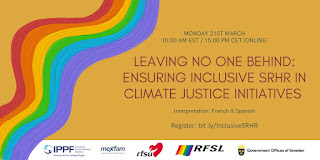Hi this is Karin, I work for Rutgers on international advocacy and am engaging virtually in this year's CSW. Rutgers is active at the Commission on the Status of Women (CSW) to keep our eye out for the recommendations to include sexual and reproductive health and rights and to make them as inclusive as possible for people from the LGBTQI+ community.
So how does climate connect with sexual health?
When you think of international negotiations about
climate, your first thought probably is not about sexual health. I don’t blame
you. But during CSW, countries discuss how to make progress on gender equality, and with
this year’s theme being “climate change, environmental and disaster risk reduction
policies and programmes,” inevitably sexual and reproductive health will be
tabled. But why?
Root Causes vs Impacts
Before anything else, countries must address the root
causes of climate change and focus on renewable and sustainable ways of living.
Focusing on the impacts alone is not enough. But when we do look at those
impacts, we see they also affect sexual and reproductive health.
I’ll give you 5 examples:
- Crises make information about
sexuality and contraception hard to come by. This will result in people getting
pregnant without intending to be.
- Some of the unintended pregnancies
will result in unsafe abortions. In times of crises safe and legal abortion is rarely
marked as an essential service, that is, if it is available in the firs place...
- Extreme weather and floods disrupt
access to roads and clinics and rising temperatures and polluted air and water
make it difficult to carry a pregnancy to term, to give birth safely and to
deliver health babies.
- Sexual and gender-based violence
increases, for example in shelters women and trans people are at higher risk
for sexual violence.
- More child marriages take place as parents view them as the only way to safeguard their child’s future.
 |
| Art on the wall of the UN basement |
What you see is that when people do have access to sexual and reproductive health services, information, rights and the likes, they will be more resilient to adapt to the environmental and climate crises and to participate in climate action.
Inclusion & Diversity
The recommendations should include people with diverse sexual
orientations, gender identities, expressions and sex characteristics. I
attended a side-event this week about inclusive climate justice initiatives to
learn more about these. It was hosted by RFSL, RFSU, IPPF, MEXFAM and co-sponsored by
the Government Offices of Sweden.
Though much more was said I want to highlight three points that stood out to me:
Jeff O’Malley, UNDP:
"When small elites design responses to crises without minding the communities most harmed, these communities end up being more harmed. Many countries don’t acknowledge trans and genderfluid identities, making it difficult for them to be helped in times of crises. Decriminalizing sexual and gender minorities is needed."
Lana Woolf, SOGIESC:
"Rapid needs assessments in disaster affected communities are by design heteronormative (say what?), meaning family spaces in shelters are reserved for families that consist of a (married) man and women and their children. In other words LGBTQI+ families are broken up into single spaces because they are not acknowledged in the design. They might be less safe in those spaces."
Also Lana Woolf, SOGIESC:
"There have been times when trans people were excluded from food lines because they were not accepted in the male or female line."
COVID-19
During this virtual CSW event Hans Linde from RFSU mentioned that you see the same patterns in the impacts of the COVID-19 crisis as what can be
expected from climate crises with the limited access to contraception, abortion
and health services. Rutgers conducted research on this too
(here). We saw the disrupted health care
provision, higher vulnerability to sexual violence, and that LGBTQI+ youth had
been confined in hostile environments with unsupportive family members or
co-habitants. We must take these lessons learned during COVID-19 with us as countries
negotiate at the CSW and work to improve their climate resilient health systems.
 |
| Hek bij de NGO ingang van de VN voor de CSW (en CPD) |
From CSW to CPD
In the meantime (no rest for the wicked!)
at Rutgers we also started working on the Commission on Population and
Development (CPD). This is another United Nations commission, somewhat similar to the CSW, where member
states negotiate on recommendations with a slightly different focus. This year
it is on sustained and inclusive economic growth and there will also be some
parts in those recommendations on climate. During CPD we will also
advocate to get sexual and reproductive health and rights in the
recommendations and we will for sure take along all that was shared and learned
during this CSW!
* This blog was written by Karin van der Velde, Senior Programme Officer, Rutgers
---
For more resources check out, for example:
Do check out this CSW side event about young people in SRHR and climate movement on Thursday 24 March by CHOICE for Youth & Sexuality jointly with Rutgers, RNW Media, IPPFAR, Dance4Life and ARROW.



Comments